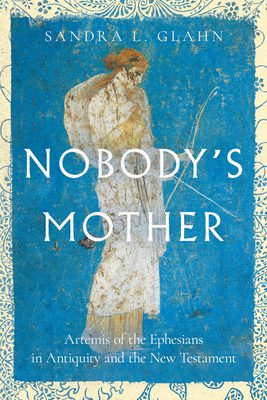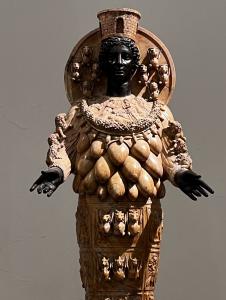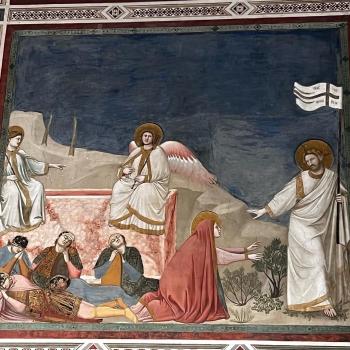 My guest today is Dr. Sandra Glahn, author of the forthcoming (October 10, 2023) book, Nobody’s Mother, which I’ve wholeheartedly endorsed.
My guest today is Dr. Sandra Glahn, author of the forthcoming (October 10, 2023) book, Nobody’s Mother, which I’ve wholeheartedly endorsed.
I love Wonder Woman. But I’m less of a fan of the goddess Diana, that is, Artemis, on whom the Wonder Woman character is based. But one thing I do love about Artemis is this: knowledge about her helps me understand parts of the New Testament (NT). The NT writers, while seeing the Greek gods as false, certainly didn’t shy away from making reference to them. Artemis gets top billing. And understanding who she was at the time of the earliest Christians helps us understand some writings of Paul that have left us scratching our heads.
The Artemis Backstory
Luke (a Gentile), in writing The Acts of the Apostles (“Acts”), mentions the Ephesian manifestation of Artemis. In fact, he does so multiple times (see Acts 19). Luke also writes about how the city clerk in Ephesus spoke of the diopet or “Zeus-fallen” image (v. 35), often translated as the “image that fell from heaven.” According to Homer, Zeus was Artemis’s father. He was married to Hera, but had a sexual liaison with Leto—who consequently conceived and gave birth to twins Artemis and Apollo. The natal site is near Ephesus.
Artemis was said to have given her mother a painless birth and then witnessed Leto writhing in travail for nine days delivering Apollo. This establishes Artemis as both firstborn and a midwife with the ability to deliver painlessly. That’s her backstory.
The Apostle Paul and Artemis
Fast forward to the time of the earliest Christians. A story about Artemis in Ephesus recorded in Acts 19 includes how a disturbance arose in the city because its silverworkers felt the apostle Paul’s gospel ministry was cutting into sales of Artemis souvenirs. Her temple was the jewel in the crown that was the Seven Wonders of the Ancient World, so the drop in sales due to Paul’s teaching risked shaming their goddess. Consequently, the people rushed into the theater (which held 25,000 people and is still standing), and for two hours chanted “Great is Artemis of the Ephesians.” Paul had already planned to leave Ephesus for Macedonia, but this brouhaha moved up his timeline. Later, he wrote a personal letter back to his protégé in the city telling him “As I urged you when I went into Macedonia, stay there in Ephesus so that you may command certain people not to teach false doctrines any longer” (1 Timothy 1:3).
We know from Acts 19 that magic and Artemis were strong spiritual forces in Ephesus. From inscriptions, we connect the two rather than seeing them as separate spiritual forces. So, what did Artemis followers believe?
The Nature of Artemis Worship

Rather than being a mothering fertility goddess, as many have supposed, Artemis was a virgin in the strictest sense, thought to have the power to deliver women safely through childbirth—or kill mother, child, or both painlessly. Childbirth was the number-one killer of women in the ancient world, so Artemis was quite popular. In one manifestation of the goddess at the time as seen in the statuary and coins, she carried a bow, arrow, and quiver—much as Wonder Woman appears today. But in other statues that existed simultaneously with the first she is covered with bulbous appendages that scholars believe to be Hittite magic sacks. As I like to explain it, Barbie can be both the president and an architect. And Artemis could exist in more than one form.
The writings and inscriptions dating to the time of the earliest Christians tell us people believed she could save or deliver people, but also that her arrows could both kill or euthanize painlessly. Her cult consisted of both male and female devotees, so she was not for “women only” any more than devotees of the Virgin Mary are “women only.” (I’m not suggesting the two are parallel; only that there are some analogies.) We know from inscriptions that many of the cult positions related to Artemis-worship were filled by females, especially females unattached to men, who had wealth and position. One position existed solely for providing the goddess with apparel.
As Homer told it, Artemis asked Zeus to give her many titles. And in her creation story, she was first. Inscriptions dating approximately to the time of Paul address or describe her as savior, lord, god, first Throne, manifest, and many more.
Implications for Understanding Scripture
It’s interesting to note, then, that when Paul writes his personal missive to Timothy (not to the church in Ephesus, by the way), he begins not with his usual “grace and peace to you…” but “Paul, an apostle of Christ Jesus by the command of God our Savior and of Christ Jesus our hope…” Some scholars think the author can’t possibly be the apostle Paul because he usually does not use the word “Savior.” But what if he was borrowing from the “Artemis vocabulary” in the same way someone might say “kryptonite” if they wanted people to think of a certain superhero. Later in the letter, Paul expresses concern for women’s modesty as it relates to gold, pearls, and expensive apparel (1 Tim 2:9). Were the women in the church influenced by their city’s religious emphasis on apparel and wealth?
Speaking of women, or perhaps specifically wives, Paul wants Timothy to “let them learn” (v. 11) but their demeanor (apparently not “in quietness” or “full submission”) needed to change. And they were to stop teaching men (or perhaps husbands). Paul follows up, giving his rationale for this limitation—Adam was first, and the woman being deceived was in transgression.
Could Paul have been correcting a wrong creation story (Artemis first and preeminent) with the true one—the Genesis story (woman second and not free of guilt)? Were women in Timothy’s congregation going house to house (5:13) teaching nonsense—a word Paul uses that Luke used elsewhere in connection with the magic? If so, Paul’s limitation would put men and women (or husbands and wives) on a more equal plane in the context of a god who was a preeminent female.
The consolation Paul adds is this: “But she will be saved through childbearing”—followed by a qualification: “if they continue in faith and love and holiness, with self-control. This is a faithful saying.” Could “she will be saved through childbearing” be an “Artemis saying”? Is Paul taking a local saying and giving it his own Christian spin? He had a habit of doing so.
Is Paul replacing the number-one perceived benefit of Artemis (delivery through childbearing), which addressed the number-one fear of Gentile women, with the suggestion that Jesus is stronger and better?
It would certainly be consistent with his approach and his priorities.
Our first cues for seeing the text this way come not from Homer but from the Book of Acts, which flags for readers that the context in Ephesus is magic and Artemis worship. The silverworkers’ spokesperson acknowledges the Gentiles are changing their behavior as a result of Paul’s teaching about gods and idols (19:26). What would be the effects on the synagogue-planted church if women from the Artemis cult became followers of the Messiah Jesus? Can you imagine?
But even Wonder Woman has never been a mother goddess, a fertility goddess, connected with prostitution, or a man-hater. What is true of her, though, is that an understanding of the goddess who inspired her just might help us better understand some parts of the NT. And such an understanding points to this reality: Jesus is better.
Who knew our high school Greek mythology lessons would help us understand the Bible better? Read an excerpt of Glahn’s book here, then grab a copy for yourself. She has written two dozen other books and Bible studies as well, which you can find on her Amazon page. You can find Dr. Glahn interacting online here, here, and here.












